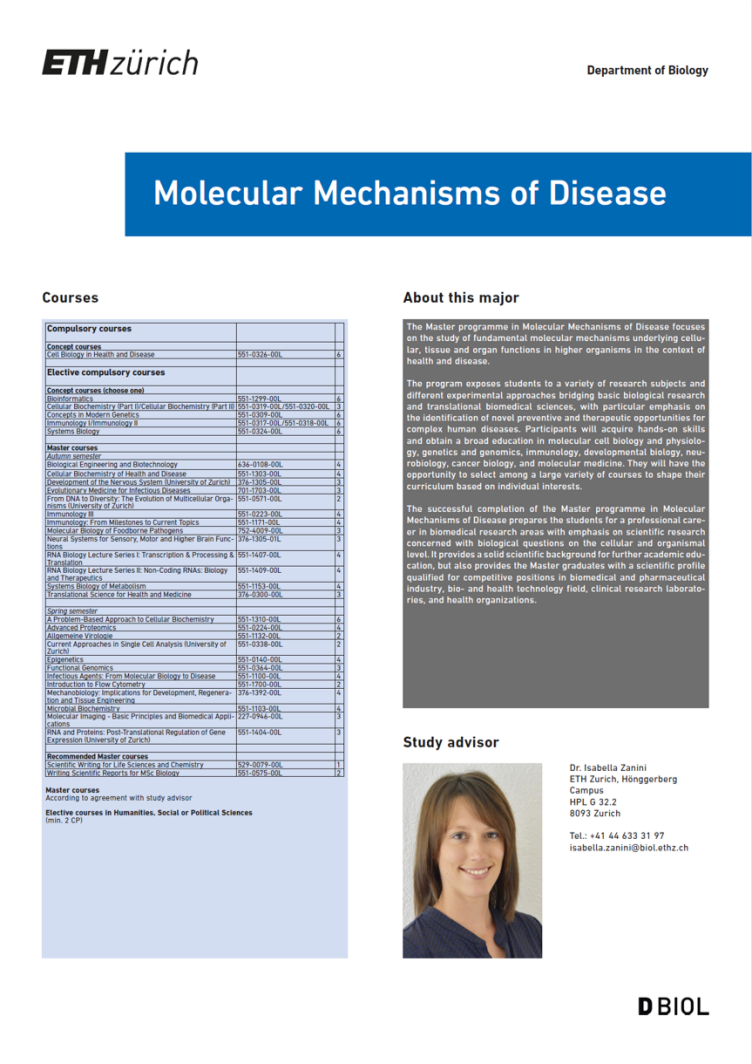Molecular Mechanisms of Disease
Important information
The Master programme in Molecular Mechanisms of Disease focuses on the study of fundamental molecular mechanisms underlying cellular, tissue and organ functions in higher organisms in the context of health and disease.
The program exposes students to a variety of research subjects and different experimental approaches bridging basic biological research and translational biomedical sciences, with particular emphasis on the identification of novel preventive and therapeutic opportunities for complex human diseases. Participants will acquire hands-on skills and obtain a broad education in molecular cell biology and physiology, genetics and genomics, immunology, developmental biology, cancer biology, and molecular medicine. They will have the opportunity to select among a large variety of courses to shape their curriculum based on individual interests.
The successful completion of the Master programme in Molecular Mechanisms of Disease prepares the students for a professional career in biomedical research areas with emphasis on scientific research concerned with biological questions on the cellular and organismal level. It provides a solid scientific background for further academic education, but also provides the Master graduates with a scientific profile qualified for competitive positions in biomedical and pharmaceutical industry, bio- and health technology field, clinical research laboratories, and health organizations.
Every student's study programme is defined in the learning agreement in myStudies.
- Go to “Functions” -> “Learning agreement”. The compulsory courses are already listed. The compulsory electives and the elective courses can be entered according to the discussion with your major advisor. In the end submit your entries to your major advisor for approval.
- The learning agreement does not have to be complete in the beginning and it can be changed during the course of the study time. All additions and changes have to be approved by your major advisor.
- All compulsory courses are marked with “Yes” in the section “Completion of mandatory courses”.
- Compulsory courses that were done in the ETH Biology Bachelor’s programme have to be marked with “Other programme”.
- In the rare case a compulsory course does not have to be taken with agreement of your major advisor it can be marked with “No”.
- The section “ECTS credits” shows the planned, the needed minimum and the missing CPs in the categories “Compulsory Subjects and Compulsory Electives”, “Electives” and “Research Projects” (not shown Master’s thesis, Master’s exam and GESS-course).
- For the Master’s degree 24 CPs must be acquired in the categories “Compulsory Subjects and Compulsory Electives” and “Electives” whereof at least 18 CPs have to come from the category “Compulsory Subjects and Compulsory Electives”.
- Courses listed in the learning agreement must be registered in myStudies under “Course registration” (no automatic transfer!).If a course is registered, the dot in front of the course’s name in the learning agreement turns green. Without a registration it turns red.
The former Master's specializations "Cell Biology" and "Molecular Health Sciences" have been merged into the specialization "Molecular Mechanisms of Disease Development" and will not be continued. For information and questions regarding these two specializations, please contact the study advisor Dr. Isabella Zanini.
